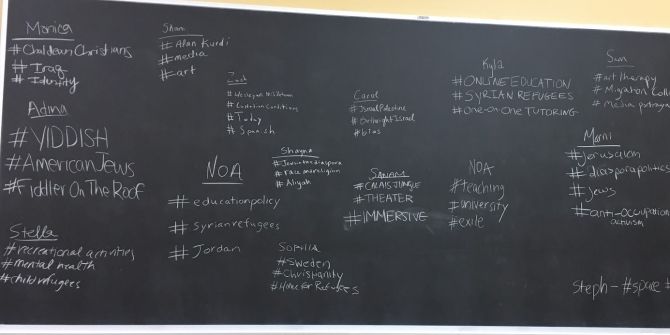In September 2020, the UK Government launched a new curriculum for relationships and sex education (RSE) in schools. Some religious groups have opposed this move, including Ultra-Orthodox Jewish communities. In this article, Lea Taragin-Zeller and Ben Kasstan discuss how an ‘age-stage analysis’ of the issue can offer nuanced tools to engage religious minorities and policy-makers over these sensitive, yet crucial, areas of education.

Relationships and sex education (RSE) requires a delicate balance between a child’s right to comprehensive education versus their right to have education that is compatible with their social and religious worldviews. Opposition to teaching about abortion and LGBTQ inclusion in schools in Poland, Britain and the USA signals how policy makers in a range of jurisdictions struggle to respond to the demands of increasingly diverse populations. In the UK, specifically, recent attempts to reform RSE, and incorporate LGBTQ relationships within secondary school curricula, have been opposed by religious groups and remains an unresolved issue.
Whereas the dilemma of state intervention in sex education has mainly been studied by socio-legal scholars as a rights-based issue, an anthropological approach raises pressing questions about who holds responsibility over knowledge and how that responsibility is met in practice. Based on our ethnographic study among religiously Orthodox groups, we found that competing models of ‘knowledge responsibility’ exist between the state and religious minorities vis-à-vis sex education. This issue raises critical questions about how gender equality, religious freedom and human rights are reconciled today.
Ultra-Orthodox Jews are an example of how religious minorities have been clashing with statutory services over sex education in both Israel and England. Ultra-Orthodox (Haredi) Jews live in accordance with the teachings derived from the Hebrew Bible (Tanakh) as well as a voluminous body of rabbinic literature, commentary, and rulings. Haredi children often attend faith or independent schools, where female students usually study math and science up to the age of 15, as women are expected to navigate the non-Haredi world as wives, mothers, and main breadwinners. The Haredi education system raises boys, on the other hand, with the expectation of being Torah scholars, bestowing little, if any, formal science, maths and English language education. Although much public scrutiny has focused on the lower levels of secular (chol) education in Haredi schooling, one of the topics that is increasingly gaining traction is RSE.
Sex education at the right (st)age?
The issue of age-appropriate sex education is threatening for Haredi faith schools because it collides with community members’ and religious authorities’ anxieties regarding the proper timing, language, and content of sexual and reproductive knowledge. We found that among Haredi Jews, ‘knowledge responsibility’ is assumed by religious authorities and transmitted at appropriate and relevant stages in the normative Jewish woman’s lifecourse, punctuated by key transitional moments of marriage and childbirth. State-based education programs instead promote age-appropriate models of knowledge as a preventive strategy, for example, avoiding ‘teenage pregnancies’ and domestic abuse, and to enable young people to lead safe, consensual and fulfilling sex lives. The state notions of age-appropriateness are in direct opposition as premarital sex is forbidden under religious law (halachah) and socially-sanctioned.
Whereas Haredi religious rights activists claim that RSE is the prerogative of the family domain, in reality, the responsibility for transmitting women’s body knowledge pertaining to marital relations and childbearing is passed to female informal educators, such as teachers and doulas. Knowledge around sex is mediated carefully among Haredim, addressed in hushed tones and only formally broached as part of marriage preparation and upon childbearing. In a vacuum of formal RSE, informal educators struggle to mend the gaps in knowledge by creating one-on-one female knowledge transmission settings at relevant moments in the Haredi lifecycle. Formal exposure is overwhelmingly geared towards women, and consists of a series of one-on-one callah courses – literally bride classes that are led by a Rebbetzin or Rabbanit (e.g. a rabbi’s wife, or informal educator). Callah classes vary in their quality, quantity, and philosophy (and are as ‘good’ or comprehensive as the particular teacher feels able to offer). Most of the callah classes focus on knowledge transmission of the laws of purity regarding menstruation and promote procreation within the first year of marriage. More comprehensive approaches might go beyond the laws of purity and prepare women for the emotional transition of marriage. Education for Haredi men, however, is less prevalent and less comprehensive, with marital preparation for men (chatan classes) conducted by a rabbi.
Yet, the female and male pre-marital programmes are not synonymous with state sex education programmes and do not cover the language of consent to the same extent, if at all. Rather than being inclusive, it is based on a model of cisgendered, heterosexual reproduction within the domain of marriage. Yet, not all Haredi parents support the ‘knowledge responsibility’ presided over by religious authorities, who instead view curricula in the general population as having benefit for Haredi Jewish adolescents. In the words of one of our research participants, Chava, “I didn’t know how to be with my husband”, which signals that the quality and quantity of the informal sex education she received just was not enough.
LGBTQ education is even more fraught to include in school curricula. Building on our distinctions between age-appropriate and stage appropriate, LGBTQ education does not filter in at any stage in the contemporary Haredi normative life – and thus are never viewed as ‘stage-appropriate.’ Thus, the controversy around introducing LGBTQ inclusion in religious contexts is much deeper than a contest over knowledge content. It is viewed as being in direct contestation of the Haredi way of life. It is for this reason that our conceptualization of age-stage appropriate education is useful to highlight how LGBTQ inclusion is one of the biggest obstacles to Haredi models of RSE, as well as state equality laws.
The ‘age-stage’ analysis offered in this post shows how anthropologists can offer nuanced tools to engage religious minorities and policy-makers over sensitive, yet crucial, areas of education. Anthropology, as a discipline, lends itself well to bottom up and comparative studies that take a broad look at both informal and formal education, and how responsibilities and rights are approached in increasingly diverse populations. Secular education and RSE pose major challenges for minority-state relations beyond the case at hand. As these tensions continue to unfold, we call for more researchers to explore what educational policies and\or communal efforts may help overcome obstacles to LGBT inclusion.
Note: This piece gives the views of the author(s), and not the position of the LSE Religion and Global Society blog, nor of the London School of Economics.





